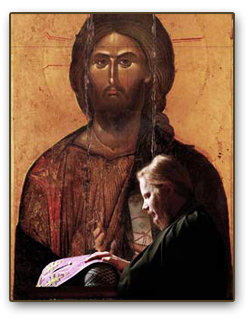Protopriest Peter Perekrestov�
"Let Us Thank God Not Only For the Time to Repent, But to Labor for the Church and for Constructive Work"
(Interview with Tserkovniy Vestnik)�
 "Let Us Thank God Not Only For the Time to Repent, But to Labor for the Church and For Constructive Work"�
"Let Us Thank God Not Only For the Time to Repent, But to Labor for the Church and For Constructive Work"�
It is clear that the editors of Tserkovniy Vestnik [Church Messenger] face a difficult task. On one hand, you are an official organ, on the other, if the newspaper is overly rigid, no one will read it. On one hand, it is necessary to define the position of the Church on a wide range of topics, on the other hand, the publication must be a living thing, there must be freedom in publication. You have succeeded in combining these functions in the issues of Tserkovniy Vestnik that I have read.�
All printed publications must also now compete with the internet, and that is a great challenge. People want information immediately, they want everything and they want it now. A magazine can barely keep up with the instantaneous dissemination of news in the virtual world. And yet I personally prefer to have a newspaper or a magazine in my hands than to read from a computer screen. Also, articles published in journals and newspapers can be re-read, they stay in one's memory. It is also more pleasing to look at photographs on the printed page.�
I see great promise in the area of cooperative efforts. The treasures of the Russian diaspora have not yet been completely discovered in Russia. There are religious authors who are less well known then those of the "Paris School," yet who are also very interesting. They had the gift of explaining complicated topics in a fairly simple and comprehensible way.�
As one example of such cooperation, we could give Tserkovniy Vestnik the articles of a theologian renowned within the emigration, Protopresbyter Michael Pomazansky. Though he wrote many years ago, his basic theses are germane even today. He has a series of articles which concern the establishment of parish life, questions of conciliarity and of church cooperation. I feel that all of this is important in our day.�
When a magazine only reports on official meetings, visits, etc, it becomes overly dry. It is always worth remembering that the life of each parishioner, the life of each priest is bound to the parish. The parish is that aspect of the church organism that is closest to us. We enter the temple every Sunday, Saturday and holidays. I would like to see more materials on divine services. I do not mean polemical tracts, for instance, whether we should introduce the Russian language or not. It is crucial for the divine service to spring to life in the heart of each person. We should not change the divine services, we must reveal their depth, their meaning. This is very real. What can we say, even we priests, in our sermons, talk more often about the lives of saints, on morals and ethics, but say relatively little about divine services.�
I think that many people, even regular parishioners, do not absorb the divine service to the degree necessary, it eludes their hearts. Yet the divine service must be understood not only in terms of its language, but from the point of view of the sacramental act. It is important, very important, to pay special attention to this aspect of church life.�
I rarely attend patriarchal services, but when I attended on the namesday of His Holiness Patriarch Alexy, during the great laudation [the singing of Many Years to the heads of the Local Orthodox Churches�Ed.], I thought that this is our response to globalization! And this Orthodox globalization preceded the modern one by two thousand years!�
There are other topics: church singing and art, and parish life in general, the life of the community. How do we invigorate it? Where does our responsibility lie? What is the role of the clergy? Healthy parish communities form real spiritual families, and their dioceses will be strong. If the dioceses are strong, the Church is strong. That is where it all begins.�
I wish the readers of Tserkovniy Vestnik the following: today we see that everyone wants to criticize, not give praise, only the negative is seen. I call upon the readers of TsV to try to live with a positive attitude, to be optimists, and not to dwell on the negative aspects of church life, of their personal lives and of society. There is an apostolic legacy: "Rejoice with joy unspeakable" (1 Peter 1:8), but we too often neglect it. I remember a somewhat famous parable of Elder Paisius of the Holy Mountain in which he says that people are divided into two categories: the bees and the flies. A fly would hover over an enormous garden of flowers, but would only find manure: a fly is always attracted to manure. A bee, however, can fly over a field of manure and find a flower. So should we Christians try to find the positive in each person. The most important thing is to be constructive and bright. This should be our attitude in general. For victory is in our hands. The Lord promised us that the gates of Hell shall not overcome the Church. Let us thank God for the time that is given to us, not only to repent, but to labor for the Church and for constructive work.
